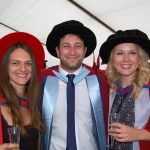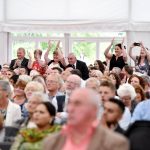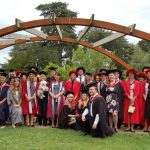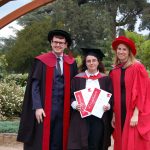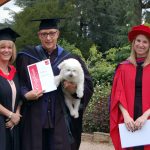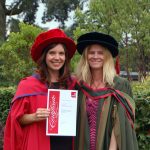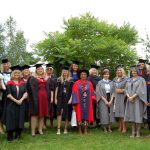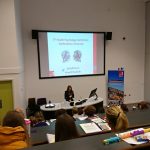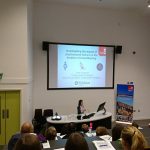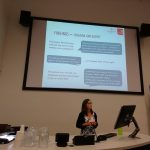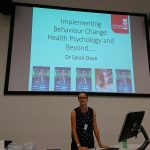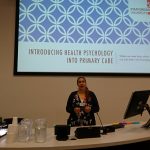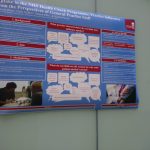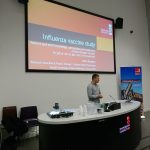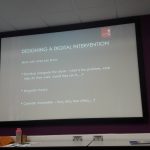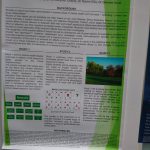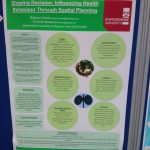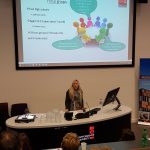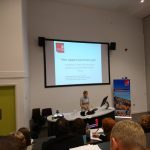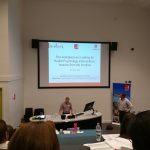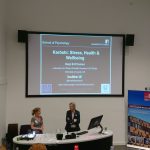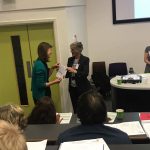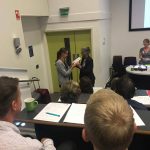
Dr Richard Jolley
Dr Richard Jolley (Senior Lecturer in Psychology and member of the Staffordshire Centre for Psychological Research) blogs about a recent international visit to present his research:
It is always a pleasure (and indeed an honour) to be invited to speak about one’s research at another University, but particularly so when that University is abroad. So, I set off on April 26th to Lausanne, Switzerland, very much looking forward to presenting my work on the development of children’s expressive drawings. An additional bonus was that I’d been invited to a workshop on ‘children’s drawings of gods’, as I had a theological as well as a psychological interest in this topic.
The trip however did not begin well, as I discovered just before I landed in Geneva that the currency I brought with me was Swedish Kroner rather than Swiss francs; a lesson to be learned if one acquires foreign currency from a supermarket! The difference in Kroner and Franc exchange rates meant I had the equivalent of around 6 pounds worth of currency, not something that goes very far in Switzerland! Nevertheless, I managed to get a train to Lausanne, and although arriving very late at night I quickly discovered that the city is built on a sharply-rising terrain providing (once morning arrived!) beautiful sights of Lake Geneva below.

On the first day I attended a workshop on an international project of “Drawings of gods” led my Professor Pierre-Yves Brandt. So far, they have collected over 6000 children’s drawings from 8 countries (http://ddd.unil.ch/). In the workshop I was invited to comment on the drawings from my expertise in the expressive aspects of children’s drawings, but I was also struck by their theological significance, particularly those drawings that presented God from a Christian perspective that I am more familiar with. Some drew God in human form, most noticeably in a ‘Jesus-type’ figure dressed in flowing multi-coloured clothes expressing peace and love. Other pictures were equally expressive but showed God in less concrete forms, and in more ethereal settings of clouds and heavens, such as the one below.

The child wrote the following about the drawing (translated from French):
“I drew God as though he was putting a smile and laughter bouts to people who call him and they are happy. By talking to him they get colours, animals as well as humans”
Because of the cross-cultural nature of the project God was presented somewhat differently in countries where other faiths such as Islam and Buddhism are more prominent. But regardless of age, educational and religious background many of the drawings expressed a personal communication of how each child saw God.
In the afternoon I presented my talk to staff and students on the development of children’s expressive drawings. The talk began with an overview of the different techniques children use to express moods and emotions in drawings, particularly literal (e.g. a smiling face), content (the countryside scene on a sunny day) and abstract (bright colours, uplifting lines, balanced composition, etc.). All three of these techniques can be seen in the following drawing:

The developmental path in which children improve the expressive quality of their drawings has been a long-standing debate in the literature, and one part of the talk discussed a recently published article in which I was the lead author (Jolley, Barlow, Rotenberg & Cox, 2016) that addressed this question. Our findings showed that although children generally improve the expressive quality of their drawings with age, this is somewhat facilitated by their increasing ability to use representational realism. However, once the children’s representational drawing ability is statistically controlled for the developmental pattern tends towards a U-shape curve, with very young children and adolescents/young adults producing expressive drawings of higher quality than school-age children.
During my visit I also had the opportunity to discuss ideas for future work with Grégory Dessart, a PhD student working within the ‘Drawings of gods’ project. Grégory will be working in the Department of Psychology at Staffordshire University as an academic visiting researcher for 6 months from the beginning of October. His stay will overlap another visiting researcher who is currently working with me, Dr. Romina Vivaldi from Argentina, who you can read about here.
This trip to Lausanne was soon followed by a research trip to University of Thessaly, details of which will follow in a separate blog (click here to read about my trip to Greece).
This pair of trips was very humbling to see one’s work and ideas influencing researchers from other countries. The conversations that ensue not only continue to drive my research interests in this area of children’s making and understanding of pictures, but also impact my teaching in this subject, particularly in the final year option psychology students at Staffordshire University can choose in this subject that I lead.
References
Jolley, R.P., Barlow, C.M., Rotenberg, K.J., & Cox, M.V. (2016). Linear and U-shape trends in the development of expressive drawing from pre-schoolers to adult artists. Psychology of Creativity, Aesthetics and the Arts, 10, 309-324.
Jolley, R.P. (2010). Children and Pictures: drawing and understanding. Oxford, UK: Wiley-Blackwell.
The Department of Psychology at Staffordshire University  offers a range of undergraduate and postgraduate degrees in Psychology at the University’s £30 million Science Centre in Stoke-on-Trent.
offers a range of undergraduate and postgraduate degrees in Psychology at the University’s £30 million Science Centre in Stoke-on-Trent.
Interested in a Psychology degree? Come to an Open Day – for further details, and to book your place at an open day, please visit: http://www.staffs.ac.uk/openyourmind/
For more information about the Psychology degrees on offer at Staffordshire University please visit the below pages:
 The Conversation: Just like humans, more cats and dogs are living with chronic health conditions
The Conversation: Just like humans, more cats and dogs are living with chronic health conditions centre of excellence for teaching and research in Health Psychology, and is home to Staffordshire’s BPS Accredited Stage 1 MSc in Health Psychology and Stage 2 Professional Doctorate in Health Psychology. The Centre for Health Psychology is part of the Staffordshire Centre for Psychological Research.
centre of excellence for teaching and research in Health Psychology, and is home to Staffordshire’s BPS Accredited Stage 1 MSc in Health Psychology and Stage 2 Professional Doctorate in Health Psychology. The Centre for Health Psychology is part of the Staffordshire Centre for Psychological Research.









 offers a range of
offers a range of 












